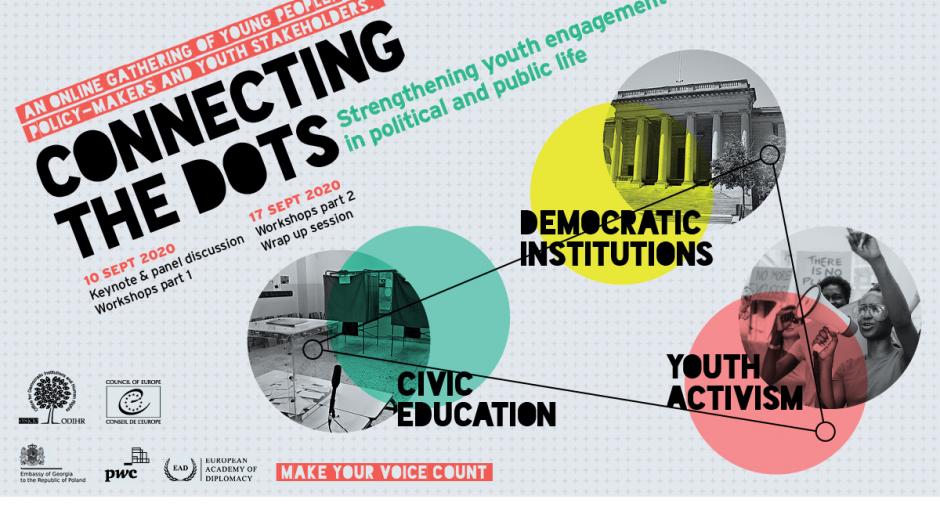Connecting the Dots: Strengthening youth engagement in political and public life
When
Where
Organized by

The event and workshop series will “connect the dots” between young people, policy-makers and other youth stakeholders in order to deepen understanding of the needs and contributions of young people to political and public life across the OSCE region. This takes place in the context of a rise in importance of digital access to institutions and decision-making processes due to the COVID-19 crisis.
Participants will collaboratively produce an "Agenda for Youth and Democracy" for democratic institutions and other stakeholders to consider in support of public and political participation of young people.
Topics
The keynote and panel discussion will feature young people sharing their experiences in a number of areas, such as mobilizing communities and engaging in political life through established as well as innovative methods of participation.
The workshop series will explore:
- democratic institutions and meaningful youth engagement in decision-making
- youth activism and participation through non-conventional means
- civic education as a foundation for youth engagement
Registration
To register for the event, please visit: https://odihr.wufoo.com/forms/connecting-the-dots-registration-form/.
Background
OSCE participating States have acknowledged that “youth and children require particular attention and that their needs, concerns and interests should be addressed in a comprehensive manner”. They have also recognized that “youth are an important part of society” and “the role that [youth] can play in supporting participating States in the implementation of commitments in all three dimensions”, along with a preponderance of other documents specifically recognizing young people.
Likewise, other international institutions and organizations have taken note of young people’s enthusiasm, engagement and ability to contribute substantively to political and public life. This focus on young people attempts to capitalize on the so-called “demographic dividend” - which acknowledges that focus on and investment in young people can result in society-wide positive future outcomes as these young people take up positions in democratic institutions and other public fora.
The Council of Europe pays also particular attention to the issues related to youth. During Georgian Presidency of the Committee of Ministers of the Council of Europe, the Committee of Ministers adopted the Council of Europe youth sector strategy 2030. The Strategy defines the framework within which the Council of Europe youth sector will pursue its aim to enable young people across Europe to actively uphold, defend, promote and benefit from the Council of Europe’s core values of human rights, democracy and the rule of law.
Furthermore, young people do not live in a vacuum, unaffected by current events and merely waiting to participate in some “future world.” The current COVID-19 pandemic offers a perfect example of this. According to a recent UN report, “young people are already among the most affected by the socio-economic impacts of the COVID-19 response.”
Questions are already arising about the future of the “COVID-19 generation” - what their needs will be and how many risk falling behind. However, many young women and men are already responding to the challenges of COVID-19. They contribute as health workers and scientists, researchers and innovators, for instance by running online awareness campaigns and volunteering to help their local and global communities.
